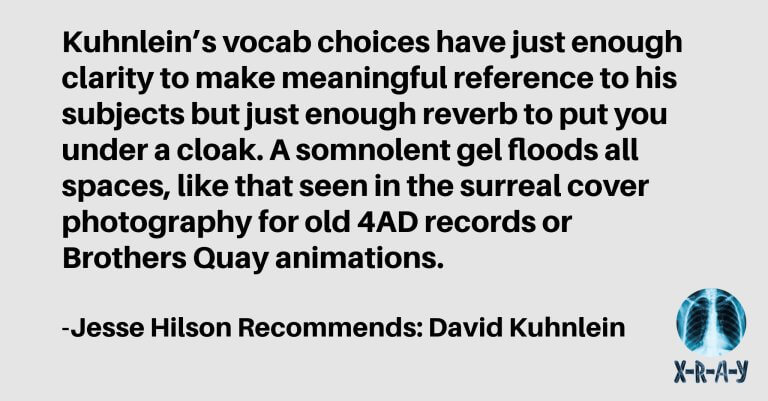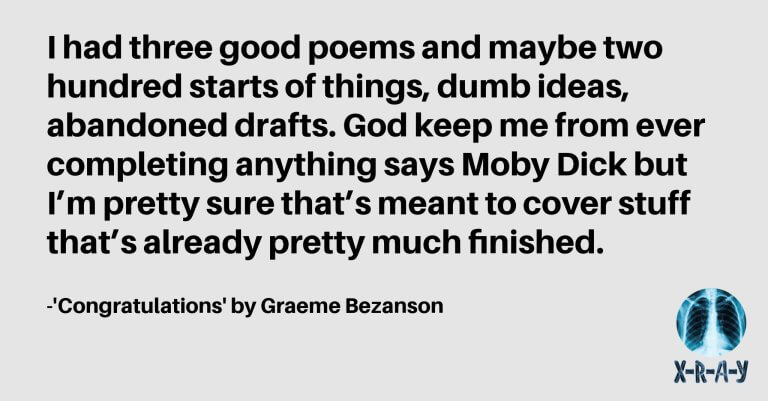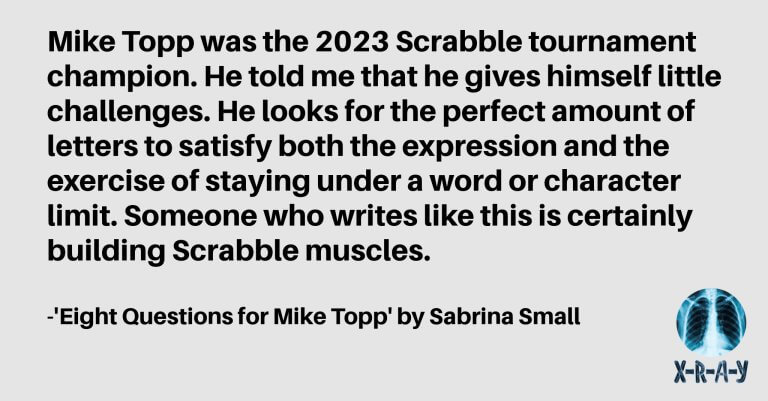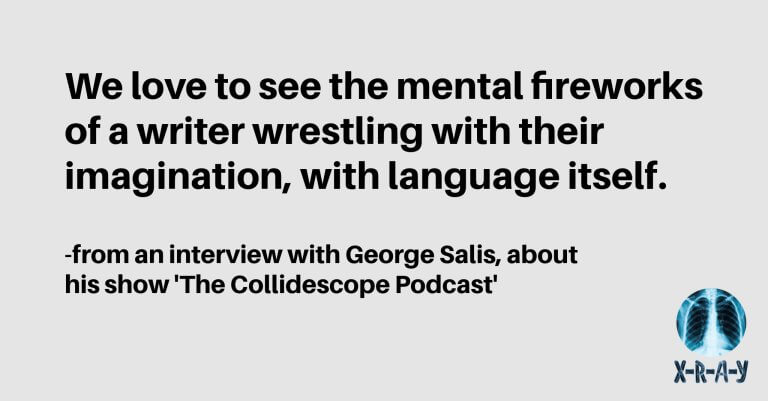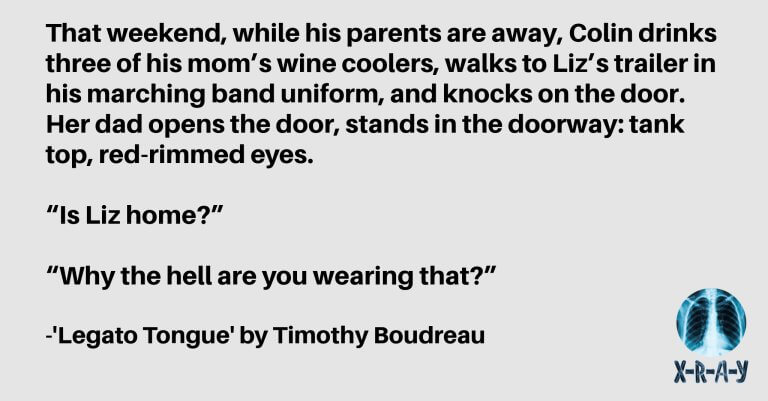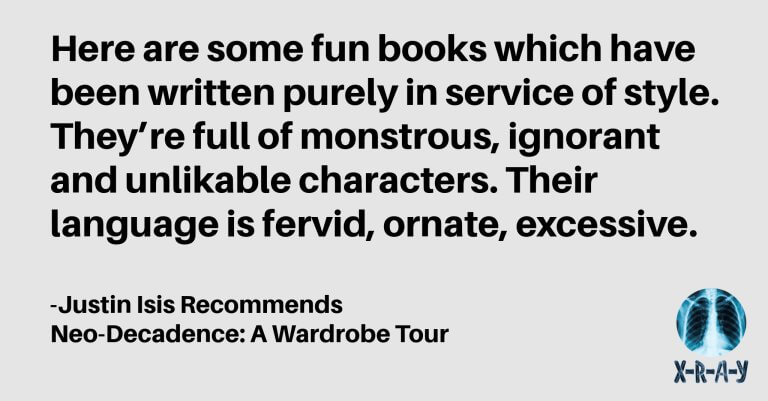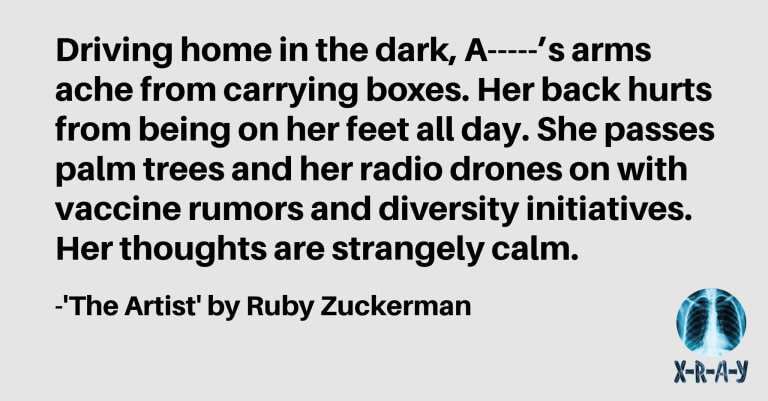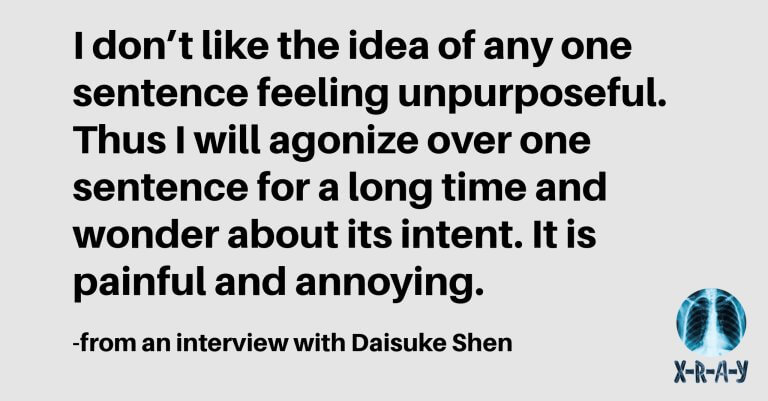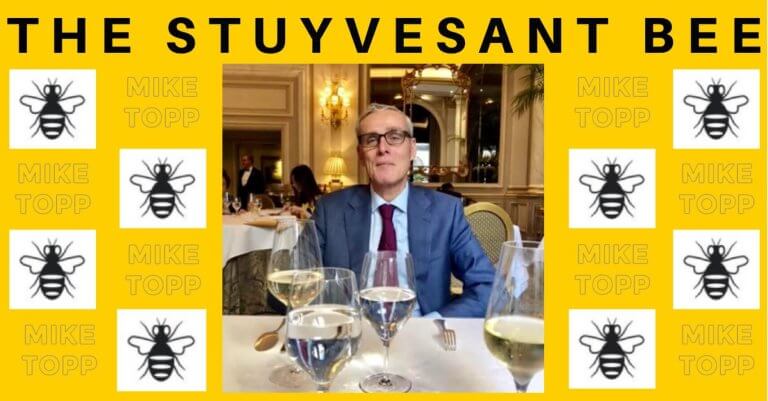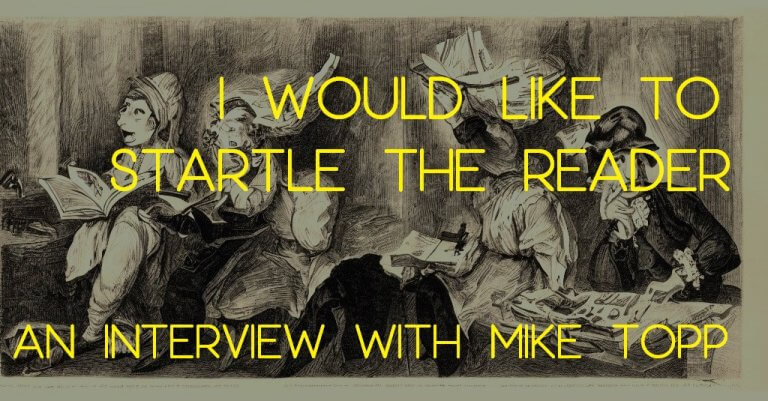August 27, 2024
A––––– hasn’t been anywhere, or seen anybody, since her unemployment money ran out. Iron wind chimes jangle when she knocks on the door, and jangle again when it opens. Someone named Sara leads her to a table in the center of the shop. Sara is wearing a cloth mask with a red and white geometric print, which makes A––––– feel self conscious about her own KN-95, like she showed up wearing a suit when Sara is just wearing a cozy sweater. Everything inside of the room is white, everything outside is gray. This makes any small moment of color extremely vibrant - each thread on Sara’s Mexican-style embroidered blouse, the raku vase of flowers on the table, the tiny mustard stain on A–––––’s pants extremely vibrant. A––––– tries to believe that she belongs in this space, full of very expensive Japanese home goods and craft objects. If she holds her head the right way and blurs her eyes slightly, she can picture it.“Thank you for taking the time to be here,” says Sara, and A––––– nods. “I want to start by hearing what made you apply.”A––––– remembers her notes, diligently written and rewritten in her notebook. Through research online she’s built this shop into a temple, and not just because it’s the only place that responded to her application. The salvation guaranteed by employment here is the answer to the question that she’s been wrestling with in the months since the pandemic began. She chooses her words carefully.“One of the things I love most about your selection is the way your products call people to slow down in their day,” says A–––––. “Treating everyday objects, like a teacup, even a trash bin, as things worthy of thoughtful design is very inspiring to me. It matters, making small things beautiful. Slowing down.” “Well,” says Sara, “we like that slowing down, of course. We’re not Amazon.” A––––– nods. She almost believes that she’s never ordered from Amazon in her life, even though there are blue and white envelopes in her recycling at this very moment. “But you know,” Sara continues, “In the shop, it can be very busy. We work quickly. There is so much to get done, all of the time. There aren’t that many opportunities to rest. Is this okay with you?”A––––– smiles, and tries to express that appreciating supreme aesthetics and working with unprecedented speed are two compatible characteristics. It’s all very abstract. It’s been so long since A––––– really applied her efforts to anything. She straightens her spine. She shakes off her pre-emptive doubt. If Sara sees her as valuable, she will be valuable. “Well, that’s great,” says Sara. “And you’re aware, this is probably a temporary position? We usually just need the extra help to hold us over through the holidays.” A––––– can’t afford to worry about the future, so she nods. “There’s just one more thing. I’m sorry if this is an assumption…” Sara starts to laugh, raising her hands to cover her mouth, which is already covered by her mask, “but you’re not… Japanese.” “Definitely a correct assumption,” A––––– says, realizing that her mask hides the curve of her undeniably Jewish nose. “Well, you see…” Sara becomes very serious. “You would be the only one. The shop owner, Taku, moved here from Japan 20 years ago. Our staff is always majority Japanese. Even if we were raised over here, we all have Japanese heritage. And there are things we take for granted that you might not really… understand. I wouldn’t want you to feel on the outside.” A––––– bows her head and says, “Sara, I would be honored to learn more about Japanese culture. I wouldn’t feel on the outside when given this kind of opportunity.”Sara’s eyes crinkle into a smile. They stand up to start a tour of the shop. Just outside of the main room, Sara gestures to Grace, who waves at A––––– warmly from a minimal wooden table. Grace’s thick-rimmed glasses, and long hair, trigger a deja-vu type recognition for A–––––. She follows Sara but twists her neck to catch Grace thumb off the lid of her pen. The shop is so quiet A––––– can tell the cap is metal by the sound it makes when it drops. “Taku built that desk,” says Sara, “he built everything in here.” This includes rows on rows of modular cabinets, all crafted from the same unfinished plywood. A––––– learns that Taku selected each silver connecting joint from a vintage collector in Niigata. She learns that Taku designed every ceramic mug, plate, teapot, and bowl in the shop. He selected the cool glazes. He chose to leave some items without any glaze at all. A––––– picks up a small dish. It fits exactly in the palm. . So many people must have palms this size, she thinks, if Taku sculpted this without ever having met me. The plate is completely flat, except for a tiny outer ridge and an even smaller, inner indentation. “For soy sauce?” A––––– asks, but Sara is already at the exit.A––––– returns the dish to its spot on the shelf. The display has lost some of its balance. Price tags, tiny and black, are more noticeable. A––––– senses Sara’s gaze, and taps the dish, trying to leave things just as perfect as they were before she arrived. “We’ll be in touch,” says Sara, and then A––––– is on the outside. She sees a short man, his arms covered in tattoos, maze-like spirals and repeating wave patterns. He walks past her and into the shop. A––––– resentfully identifies him as a rival for her position. She clicks her car keys, and the responding chirp sounds farther away than she remembered. It takes over an hour for A––––– to get home. Meandering through side streets because the I-10 is too jammed, she passes through Culver City, Mid-Wilshire, and Koreatown. On every street, whether it’s lined with palms or apartments, homeless people or lawns, A––––– wonders what the fuck is wrong with her that she would bow her head and describe herself as “honored” to a Japanese woman.Honored.A––––– has never bowed before in her whole damn life. For soy sauce… unbelievable!Like Truman Capote dragging around his baby blanket, or Yukio Mishima bodybuilding with religious fanaticism, sometimes A––––– believes there is something special about her that sets her apart from everyone else. Small humiliations like these are just evidence of the quirkiness that comes along with her true greatness. But other times, the limitations of her world make her feel totally delusional. The “something special” is just a curse, because she has no idea how it will ever materialize. A––––– gets the job. Seiji, the man with the tattoos, also gets the job. Two new hires. No more all alone. She has a place to drive to, early every morning. She has a time card to punch.From the beginning, A–––––’s gestures appear loud, and overexaggerated, around her new cohort. Her limbs feel unpredictable and clumsy, like she might move around too quickly and destroy one of the objects she’s made the commitment to work around. A––––– helps Grace haul four brown boxes into the center room of the shop, placing them next to an oval plywood table. Behind her mask and thick glasses, A––––– realizes that Grace looks exactly like her ex-girlfriend. “Taku built this table,” Grace reminds A–––––. “If you look closely, you can see it’s made from one rectangle. After carving out the oval shape, he used the discarded corners for legs. He thinks every part of the wood is essential, even what others might have thrown away.” Grace scrapes the top of the boxes with a blade, slicing through red stamps and green tape covered in Japanese characters. Inside each box are tens of tiny brown packages, each one imprinted with Taku’s design label. Grace models how A––––– should help, placing each small parcel on the table, spreading them out so no one hides the other. Grace’s hands are tiny. Her hair is long and thick, and it hides her face while they work.A––––– is moved by Grace’s resemblance to her ex-girlfriend, who hasn’t been in touch for almost a year. There is such a disconnect between that old life and this new one. It’s better for A––––– if she doesn’t try to mesh the two and forgets about things like drinking and dancing and kissing. She wants to keep her present and her past divided, like the shop itself, which separates the bright, open, naturally lit showroom and the dark, twisting, back-end passage packed from floor to ceiling with boxed inventory.Grace hands over a sheet full of barcode stickers once all of the boxes are evenly spread out on the table. She shows A––––– how to match the UPC on each sticker to the code on the outside of the box. They stack the boxes, sorting each shape into tilting towers of rectangles and squares. A––––– feels like a child while they sticker. They work in silence, a quiet warmth floating between the two of them. When every box has its barcode, A––––– is left with a glossy sheet of blank paper. It’s done. She’s finished.They balance the barcoded boxes, and sidestep lightly to file them onto black metal shelves. There’s no ambiguity, no room to wonder whether this task was worthwhile or not. It was.“That’s Taku’s desk,” says Grace, gesturing towards a tiny table in the dark corridor, tucked behind a shelf cluttered with stacks of books, action figures, sketches, and broken inventory. Everything is only half visible, interrupted by cardboard. “I still haven’t met him,” says A–––––.“It might be a while. He only comes into the shop when no one else is around. Very late at night or very early.”“Is he afraid of getting Covid?”“He behaved that way even before all of this. It’s just the way he likes it. Look,” Grace points to a pile of geometric bronze incense holders. “He was here today. I realized I had made a huge error, not having these on display in the main room. He catches every little thing. He always notices.” A––––– looks over her shoulder, half expecting Taku to be right behind her, nodding with solemn approval. She wonders if Taku knows who she is and if he agrees with Sara’s decision to add her to his payroll. Maybe he wants her to keep working after winter comes. Maybe that something special inside of A––––– is the willingness to do exactly what Taku wants. The sun goes down before the end of their shift. Before setting the alarm, they attempt to complete a ritual. “Otsukaresama desu,” says Grace.“I sound so stupid when I say it,” says A–––––.“The trick is to avoid placing emphasis on any vowels. That’s a big difference between Japanese and English. No stress on the vowels.” “No stress on the vowels,” A––––– repeats, instead of saying thank you for your hard work in Japanese. Driving home in the dark, A–––––’s arms ache from carrying boxes. Her back hurts from being on her feet all day. She passes palm trees and her radio drones on with vaccine rumors and diversity initiatives. Her thoughts are strangely calm. She doesn’t have to question her value. The boxes weren’t stickered before she got there, and now they are resting in their correct place, organized efficiently, waiting for Taku’s inspection. Tomorrow there will be more ways to make herself useful. Life outside the shop has shrunk to just a few hours flanking her commute. She doesn’t speak to much of anyone. She mostly watches TV. It would be cool if she could propel the functionality of the shop into her own tasks, like laundry and grocery shopping, but instead they pile up chaotically in her studio apartment. She wonders if her coworkers are like this too, only fully alive when they walk through those shop doors. The store is closed to customers for the first half of each day. It can feel cavernous in its minimalism, yet it’s very difficult for A––––– to find a place to sit and eat lunch. She could irreparably damage Taku’s hand-carved tables with a spill, or scratch. This leaves only three options: the tiny bit of counter space between the microwave and the sink in the kitchen, the tiny bit of surface space on the packing table, and the passenger seat of A–––––’s own car. She feels stumped by Taku’s lack of forethought. Every product in the shop implies a graceful and respectful way of living, yet there is nothing to accommodate a team of people working here for eight hours a day, with a lunch break too short to vacate the premises. It’s uncomfortable. For lunch, A––––– heats up a curry from Trader Joe’s. While it spins in its microwave circle, she crushes up sheets of paper towels to cover her garbage in the trash can. She assumes that she is the only one who doesn’t cook her lunch at home, imagining her coworkers’ apartments as extensions of the shop, while hers just kind of sucks.A––––– carries her Trader Joe’s lunch with sweater sleeves pulled over her hands, buffering the heat of her ceramic dish. The dish is one of Taku’s designs that was ultimately rejected because the clay was too damp when it was fired. Mold is growing inside each piece. The unglazed gray clay will eventually mutate into a greenish tinge. ‘Till then, these dishes belong to the staff. On her way to the packing station, she sees Sara’s bright dress crouched over Taku’s desk. A––––– sees the back of Sara’s head and metal lunch containers, open to reveal thinly sliced pickles, white rice dusted with furikake, and a poached slice of salmon. Sara is holding bamboo chopsticks. A––––– hopes Sara will turn around and A––––– will see her face. Instead, before A––––– can reach her, Sara pulls up the blue surgical mask dangling from her ear.They don’t even have a moment of eye contact. Sara schedules A–––––’s shifts and sets the terms of A–––––’s employment, which feels less and less permanent as the holiday season sneaks closer and closer. If A––––– tries to visualize Sara’s face, she can’t.A––––– eats her curry at the packing station, keeping her elbows drawn tight to her sides. She covers her mouth and nose with her hand while she chews, careful to angle herself away from where Seiji is working. He’s tearing paper, crumpling it, pulling tape across brown boxes with a shriek from the dispenser.As winter gets closer, A––––– starts packing online orders. The shop’s website has become the main point of sale. A––––– feels robbed, watching this influx of Yuletide commerce without getting to meet the customers behind it. There are no faces, or affects to attach to the people out there paying high prices to attain immaculately designed teapots and coffee strainers and metal canisters and etched glasses and iron bookends, only 90210, 90240, 90265. A––––– stands next to Seiji at the packing station. He instructs her.“The first thing you want to do is unpack the object and make sure it doesn’t have any defects,” says Seiji, leaning against a metal shelf full of white paper bags. He pulls a small gray box out of one of the bags and opens the lid, emptying a tiny brass paperweight into the palm of his hand. It’s in the shape of a house, glowing gold. He passes it to A–––––. It’s very heavy and pulls her hand down to the matte surface of the packing table. “What do you think it is about this paperweight that makes it worth…” A––––– opens the packing slip, “$354?” A––––– anxiously watches Seiji for his reaction. She can’t tell if he carries the same idolization of Taku in his chest, or if repetition and physical labor have worn him down. Seiji shrugs but A––––– thinks maybe he’s smiling. “Isn’t it obvious?” he says. He might be scolding, or sarcastic. “Taku designed it.” All afternoon, Seiji shows A––––– how to layer corrugated kraft paper just so to create a 1-inch buffer between each box and its enclosed object. He teaches her that products will break not from impact with the ground, but from impact with each other. This is why it’s important to make sure objects packed together are separated by padding. Once the box is sealed, you shouldn’t be able to hear any movement when shaking it around. Every object should be squeezed together as tightly as possible. No room for any shifts or collisions. Seiji pulls out another order. They inspect a porcelain white cup with three indentations on one side. “You know,” says Seiji, “This was designed to be enjoyed by blind people. Anyone can enjoy its texture. Here, close your eyes.” A––––– closes her eyes. Smooth porcelain coating. Her fingers trail around the cup and she almost loses her footing until she finds the indentations. Three on the left side. Her pointer finger, middle finger, ring finger. They fit. She shifts her fingers around. They fit perfectly again. She raises and lowers the cup in her hand. It’s like playing the piano. When she opens her eyes, Seiji is looking right at her. “It really is beautiful… ” says A–––––, and hands back the cup. “I guess Taku knows what he’s doing. It’s not the kind of stuff I would spend my money on,” Seiji chuckles, “But I can’t deny it, there’s no one else out there like him. He’s one of a kind.” As he says it, the computer screen lights up with news of another purchase. A––––– does mental calculations of how many hours she would have to work to own any of these objects. Like the lack of a comfortable place to eat her lunch, the number makes her feel squeezed. Counted, minimized, contained. They clock out and A––––– gets in her car. She tosses an empty water bottle and McDonalds wrappers from her breakfast into the back seat. Just a block away from the shop, she sees Seiji smoking. His face is softer than she imagined it to be. He looks ten years younger than she had guessed, almost a boy. He doesn’t see her when she passes, but the whole way home A––––– replays the image: his tattoos covered by a quilted jacket, his round cheeks tightening with each inhalation, a silvery cloud above his head. In the dark, A––––– thinks about her life from before. Her old self would be surprised to see this new discipline. No more neurosis and uncertainty. Her stacks of worry and regret now subsumed by categorization, structure, routine, and service. All it took was Sara’s commands, and the presence of a great artist, somewhere, somehow, shifting the scenes. At work, A––––– microwaves her Trader Joe’s meal and clutches her bowl. She sees Taku’s desk. No one is sitting there. She can’t resist. She collapses into his chair. It feels overly luxurious after so many crammed lunches. She thinks, maybe this is how I should have been doing it all along. She chews her food slowly and stares up at the shelves. Unlike the shelves in the store, there is no governing order to the stacks of paper, dusty objects, and images tacked up around here. Unlike the matte minimalism of the objects on sale, here there are bright colors, odd combinations, and unlikely shapes. A stack of small bowls, sand colored and unglazed, have been repaired with bright gold seeping through the cracks. Gaudy and exaggerated, flaunting imperfection, defect. The binding of each shard reminds A––––– of the borders between stained glass in a church. They must have been broken, maybe shattered by an overly enthusiastic hand gesture at a dinner full of wine, and hearty laughter. It wasn’t the end for them. Post-it notes, written in Japanese with a blunt pencil, are stuck to the wall at crooked angles. Further up, there are framed woodblock prints of poodles. The prints are full of bright yellow and pink. The poodles are haughty and expressive, eating bowls of cherries with big silk bows in their curls. There is nothing utilitarian about these decadent dogs, smiling and snarling from their gray walls. Resplendent. A––––– chews her food. Emotion wells up inside of her chest. Her eyes travel over vintage Japanese action figures. I love these, she thinks. She thought she loved the shop, and she does, but it feels so free in here. Like she could come up with anything. Or Taku could come up with anything, she corrects herself. She looks at adverts from ULINE held up with metal push pins, covered in big sharpie circles and Taku’s handwriting. Massive exclamation marks, question marks, underlines. Hanging from a nail above the shelf is an oversized charm bracelet, each charm a different American fast food item. My microwave meals! A _ _ _ _ _ thinks. My McDonalds wrappers! She feels like she has been obeying the completely wrong Taku this whole time. She wonders which one he prefers - the shop-Taku, or the desk-Taku. If he doesn’t sell objects like the ones gathered around his desk, is that because he doesn’t take them seriously or because his customers don’t take them seriously? She wants to write him a note and ask, but her English letters seem foreign and unintelligible. He wouldn’t be able to read them the same way she can’t read the Japanese notes that are already around the desk, trying to pass along messages for future designs and projects and disciplines and inquiries. A––––– remembers Seiji saying with such certainty, There’s no one else like him. She closes her eyes and tries to invent a completely original design. Instead, she can only picture objects Taku has designed before she came along. She can’t come up with anything that just belongs to her and her alone. She wonders if this is a flaw in her DNA, or her cultural surroundings, or the amount of money in her bank account, or just the fact that there can only be one; for great artists to exist, there have to be people that aren’t quite as great, people that only look up.A–––––’s alarm goes off. Her lunch break is over. She returns to the front of the store, her hands washed and her mask in place. Her mind is racing. Sara looks at her and tilts her head with a frown. The next day, before A––––– takes her lunch break, Sara grabs her arm. A––––– is shocked by the physical contact. “Please be sure to either stay in the kitchen or at the packing station when you eat your lunch,” says Sara. Her voice is steady. She’s deadly serious. “Of course,” A––––– says. She’s burning up. She looks at the ground. Sara nods and squints.The rest of the day, and then the rest of the week, A––––– works as diligently as ever, but she can’t stop thinking about Sara’s hand on her arm. It had felt involuntary. Civil and soft yet still tense around the knuckles. A––––– saw Sara sitting at Taku’s desk weeks ago. She was sitting there with her chopsticks and her poached fish. The treasures at Taku’s desk, the mysteries and the idiosyncrasies, are for Sara? Was this kind of exclusivity, and hierarchy Taku’s intention? A––––– imagines them meeting together, late at night. Taku bends Sara over his desk and fucks her, manicured poodles leering overhead. They keep their masks on. In a muffled voice, Sara praises Taku’s intellect while he slaps her ass and tells her to work harder. Her eyes squeeze shut, she knocks a jar of pens onto the floor. Sara likes it. They roll around. A––––– wants to laugh. Huh, she thinks, you really want all this for that? Every time A––––– thinks about Taku’s desk, she feels a yearning for a type of originality that she could claim as her own. If she wasn’t so tired after working all day, she might have the power to figure out what exactly that could look like. She starts to realize that by crowding out the rest of her life, she crowded out this possibility too. December is almost over. There is a near constant line of customers to get into the shop. The team functions, all together, at a high level. Behind a table full of stickered boxes, A––––– sees Grace drinking from her water bottle. Underneath her mask and thick glasses flecked with dust, Grace doesn’t look anything like A–––––’s ex girlfriend. Her nose is longer, her jawline less developed. The resemblance must have come from something in her body language, or maybe the tininess of her hands. “Has Taku ever told you something directly?” A––––– asks. “What do you mean?” Grace responds, pulling her mask back over her nose, “Taku and I talk every day. That’s a big part of my role.” “Well, it’s just that he’s so present in my life, but I never meet him. I never hear directly from him. It’s always, ‘Taku says this,’ or ‘Taku says that.’ Is that really how he is?”“He’s controlling…” Grace says. “Sometimes people don’t like that. It’s probably part of why he’s such a recluse.” A––––– grips the metal shelf. Her paychecks are small. Her commute is long. Her body is tired. When she lies in bed at night, she dreams about stickers and categorization. Customers want something they see on the shelves, and she searches in the back of the shop endlessly for the box, with its embossed label and deliberate packaging. She takes too long. She can’t find it. She’s become undisciplined, lazy, too tall, the word for each object sticking strangely in her mouth—Kenzan, tenugui, katakuchi, donabe, kekkai. She doesn’t even have the vocabulary to ask for help. A––––– walks into the shop, and Sara beckons her into the cardboard box hallway. No one else has arrived. Sara points at barcode stickers A––––– applied the afternoon before. “Do you see how some of these are straight while others are slightly off-kilter?” Sara says.A––––– nods. “It’s really important that you keep the barcodes straight when you sticker,” she gestures at Taku’s desk, as if A––––– didn’t already know about the stained glass church bowls, and the action figures, and the golden charm bracelet. “This is the kind of thing that will drive Taku crazy. It’s impossible for him to concentrate on his important creative work if there is no care put into the details. For Taku’s sake, please sticker more intentionally.” A––––– agrees meekly, too stunned to figure out if Sara is right about what does or doesn’t disturb Taku.In the dull, heavy light of the storage space A––––– gently peels off each crooked sticker and delicately presses them back into place. Perfectly aligned, perfectly straight. She tries to contact some of the childlike joy of those first days. Back then, a job was the only thing she needed. Instead, she feels redundant, or worse. It takes her over an hour. She hears Grace and Seiji moving about the rest of the shop, their voices muffled past the point of comprehension. When A––––– emerges, Grace is at the packing station. “Sara and Seiji are talking in the other room,” Grace says. Her eyes don’t invite any follow up. A––––– walks past Grace towards the kitchen, briefly passing through the main room of the shop. Seiji and Sara are sitting across from each other on the table Taku built. Seiji’s voice is deep enough that A––––– can pick up a few words. She hears “paid time off,” and then she hears “healthcare,” and then she hears “sick leave.” She hears him say “benefits,” and sit back in his chair, hand at his chin, brow furrowed, taking in the explanations Sara is laying out with open hand gestures. She points, she shrugs. No one has ever said these words to A––––– in the shop and A––––– has never asked to hear them. Almost like bringing up the topic would force a decision. Maybe if she never said anything, Sara would keep scheduling A––––– for 40 hours a week. But as soon as A––––– mentions it, it will all disappear - A–––––’s time card, her lunch break, Grace, Seiji, Sara. Of course, there wouldn’t be room for both of them to stay past the holiday season. Seiji will be chosen. A––––– will be discarded. A––––– catches Sara applying chapstick. A––––– has never seen Sara’s face before and tries to look away as fast as she can. It’s like vertigo. Total revulsion. Sara’s nose is too wide, her lips are too big. Nothing looks the way A––––– had imagined. The beauty of Sara’s eyes and eyebrows were lying to her. A––––– got too comfortable trusting their symmetry. She thought she knew what Sara looked like. At the end of the day:“Otsukaresama desu.” “Otsukaresama desu.” “Otsukaresama desu.” A––––– tries not to stress a single vowel. Two days before Christmas, A––––– drives in circles after the shop closes. She pulls over next to glowing windows in dark west side mansions. Maybe they’ve used objects from the shop to give their homes a sense of Eastern authenticity, not knowing anything about the man who designed them, or the intention he had behind each decision. Maybe they rhapsodize their reverence for the handmade when their guests dish out compliments. Maybe they don’t even notice the life of the objects in their homes, having trusted a decorator to populate their shelves. So removed from their own tastes and preferences, they don’t even know what they want. A _ _ _ _ _ watches palms swaying in the wind. She rolls down her windows and smells jasmine. I might as well get ahead of it, she thinks. The writing is on the wall. They don’t have enough space for me. She pulls out her car manual and rips out the last page, which is blank. She writes a note about how much she appreciated everything Sara and Grace and Seiji taught her. She wishes them luck in the new year. She’s surprised to find herself crying. She drives back in the direction of the shop. A homeless woman is napping on the bus stop bench, two streets before A––––– arrives. One street before A––––– arrives, she sees a black cat. The lamps are on in the shop, even though A––––– turned them off, with Sara and Grace and Seiji, two hours earlier. Light pools warmly outside of each window, a golden semicircle forming in front of the curtains. A––––– battles the urge to turn around. Maybe Sara or Grace stayed late, doing some sort of inventory count or reorganizing that had to happen because of A–––––'s turbulence, fully on display despite months of best effort. Her note seems silly. She rehearses what she will say if she is confronted. “I forgot my lunchbox here,” she says, even though she throws away the containers of her microwave meals after every use. “I forgot my scarf,” she says, even though it’s not quite cold enough to wear one. “Sara told me it’s important to check, if you think you have lost something.”The door to the shop is unlocked. A––––– opens it. She has never seen anything so bright. She squints, and stumbles towards the back room. When she gets there, there aren’t any boxes. There aren’t any black metal shelves. No excellently proportioned packaging, no tools encased in soft brown paper. No treasure of mugs and spoons and kettles and bookends - all etched, hammered, sculpted, stitched, carved, and cast. There is only this bright, white, brilliant light. And Taku, more beautiful than A––––– could have ever imagined, hunched over his desk. There’s a bandaid on his thumb, and he’s picked at it till the edges are frayed with loose strings. He turns around when he hears her, softly and fluidly. It’s no surprise that she’s there. “You know,” he says in perfect English, without any hint of an accent, “here, there’s room for all of us.”
Read More » 